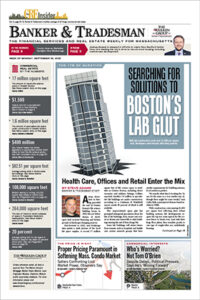Brian Kavoogian
CEO, National Development
Age: 62
Industry experience: 40 years
Brian Kavoogian leads a new leadership structure at National Development as it positions itself for the next real estate cycle. Kavoogian was named CEO of the Newton-based investment and development firm in January following the retirement of longtime Managing Director and Co-Founder Ted Tye. For most of the past decade, Kavoogian oversaw fundraising for National Development as it acquired or developed over $7 billion of real estate throughout the Northeastern U.S.
The new leadership team includes President Ed Marsteiner, Chief Investment Officer Andrew Gallinaro and COO Charlie Rollins, while Steve Kinsella remains CFO. After completing wide-ranging projects including the Lilly Seaport Innovation Center in Boston’s Fort Point and a lab development at the former Mount Auburn Club in Watertown, National Development is concentrating on growth in the senior housing sector for its next opportunities.
Q: How does the leadership transition reflect National Development’s business plan?
A: The idea of the older partners transitioning out in favor of the next generation has been in place for many years, and was a fundamental component of the stockholder agreement that the three founders created many years ago. They wanted the firm to continue on, and one of the fundamental components was ensuring that to bring in the next generation of high-quality folks, they had to have a pathway. There have to be exit timeframes for existing partners and methodology for new partners to come into the company. Ted is retiring as planned and in conjunction with his retirement, we decided to go from managing partners to a more corporate set of titles that more accurately reflects the positions.
Q: How did the relationship between Charles River Realty Investors and National Development evolve over the years?
A: Charles River Realty Investors was founded in 2006 by me and National Development, and it was our first creation of an investment management platform. In the past, National Development raised their capital deal-by-deal from institutions. The idea was we would disintermediate the institutional investment management and go directly to the institutional limited partners, rather than having someone in between. In addition to providing capital to National Development, we also provided capital to some third-party investor-developers. And then in 2012, National Development became exclusive to Charles River Realty Investors, and then at the end of 2019, Charles River Realty Investors and National Development and I exchanged my ownership to ownership in National Development. With firms like ours, typically you raise a fund and you invest, then you raise the next. We raised our Fund V in 2023. It’s just under $500 million and we’re still investing from Fund V.
Q: How have your investment criteria changed in recent years?
A: Our great competitive advantage as an investor and developer is our ability to invest across product types and strategy. What we were doing in 2012 as investors is very different than what we are doing today. As we look at the composition of every fund, it’s changed over time because of market conditions. In 2012, we were buying office buildings at the bottom of the market after the Great Recession. In Fund V, we are largely investing in senior housing. Fund IV had a heavy concentration of life science and industrial.
Q: What’s your current outlook on pursuing development versus acquisitions?
A: If you asked me at the start of 2024, if we were going to be doing ground-up development, I would have thought we were a couple of years away for that. But in fact, we think that the best risk-adjust returns out there are building senior housing ground-up. And we think that the margins and returns are more attractive in ground-up development than acquisitions.
Q: How does the recent Mall Road rezoning in Burlington affect your plans for The District property?
A: The parts of The District that were impacted were the three parcels we don’t own anymore, though we have always thought The District would be a great place for housing to be created, and we still think that. We’re going to think about the impact of that vote and whether it opens up some opportunities for us. We think multifamily would be a great complementary use within The District.
Q: What is your expectation for interest rates and how they’ll affect the industry in 2025?
A: If you were to ask most folks, they would tell you long-term interest rates were their greatest concern. We have virtually no control over the long term. We are more concentrated on what the 10-year Treasury note is doing. That is far more impacted by inflation and expectations than the Fed Funds rate. So many of the presidents’ policies are highly pro-growth, and many of those policies could result in higher inflation levels which could have an impact on rates. That could be a negative for what we are all doing in commercial real estate.
Q: In your role as a director at MassDevelopment, what do you see as the best opportunities for development at Devens?
A: We no longer have a cap on total development within Devens, and so at some point housing would be a very complementary use and we will take a hard look at that.
Q: Your partnership with Alexandria Real Estate Equities on the new Lilly Seaport Innovation Center in Fort Point was designed to use 74 percent less fossil fuels than a convention lab building. Is it operating up to the expected standards?
A: It’s performing exactly as we expected and our tenants are quite happy. We have 35 geothermal wells there and we have solar panels on the roof, and we have green steam through the Vicinity Energy network.
Kavoogian’s Five Favorite Outdoor Activities:
- Cycling on the Cape
- Skiing in the Rockies
- Paddle boarding on Nantucket Sound
- Golfing with close friends and family
- Grilling for large groups of friends and family






